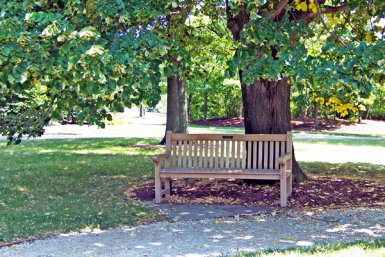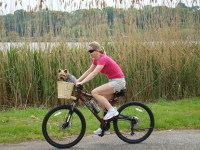Lección 5 - Presente
Introducción
Esta lección presenta el tiempo presente de los verbos ingleses. También se muestra el tiempo presente del verbo irregular muy común have. Esta lección también introduce las palabras en inglés para los colores. Flashcards se incluyen para ayudarte a aprender estas palabras muy comunes.
La lección incluye una breve conversación para ayudarte a aprender a hablar inglés en situaciones cotidianas.
Conversaciones

English
Ashley and Eric are sitting on a bench in a park enjoying a warm summer day.
Eric: What a beautiful day!
Ashley: Yes. I can't believe how warm it is.
Eric: Look at all the people walking around the park.
Ashley: I hear that it is going to rain tomorrow, so people are taking advantage of the nice weather.
Eric: Well, as much as I enjoy sitting in the sunshine, I am getting very hungry.
Ashley: You're not the only one. Let's go.
Eric and Ashley stand up and walk towards the restaurant.
Español
Ashley y Eric están sentados en un banco en un parque, disfrutando de un cálido día de verano.
Eric: ¡Qué dia tan bonito!
Ashley: Si. No puedo creer lo cálido que es.
Eric: Mira a todas las personas caminando por el parque.
Ashley: Escucho que va a llover mañana, por lo que la gente está aprovechando el buen clima.
Eric: Bueno, tanto como me gusta sentarse a la luz del sol, tengo mucha hambre.
Ashley: No eres el único. Vamonos.
Eric y Ashley se ponen de pie y caminan hacia el restaurante.
Vocabulario y Frases
 to sit
to sit
|
sentar, sentarse |
 park
park
|
parque |
 to enjoy
to enjoy
|
disfrutar de |
 warm
warm
|
cálido, tibio |
 summer
summer
|
el verano |
 What a beautiful day!
What a beautiful day!
|
¡Qué dia tan bonito! |
 I can't believe
I can't believe
|
No puedo creer |
 to walk
to walk
|
andar, caminar |
 It is going to rain tomorrow.
It is going to rain tomorrow.
|
Va a llover mañana. |
 sunshine
sunshine
|
brillo solar |
 tomorrow
tomorrow
|
mañana |
 to take advantage of
to take advantage of
|
aprovechar (de) |
 weather
weather
|
el tiempo |
 I am getting very hungry.
I am getting very hungry.
|
Tengo mucho hambre. |
 Let's go.
Let's go.
|
Vamonos. |
 restaurant
restaurant
|
restaurante |
Anuncio
Colours (Colores)
Nota: colour (UK spelling), color (US spelling).
 Yellow
Yellow
 Blue
Blue
 Navy Blue
Navy Blue
 White
White
 Grey
Grey
 Brown
Brown
 Orange
Orange
 Black
Black
 Purple
Purple
 Red
Red
 Pink
Pink
 Green
Green
 Light Green
Light Green
 Magenta
Magenta
 Cyan
Cyan
Gramática
Verbs - Present Tense
Un verbo es una palabra que expresa una acción, una condición o un estado del ser. Los verbos tienen diferentes formas para indicar si la acción ocurrió en el pasado, está ocurriendo actualmente o ocurrirá en el futuro. El tiempo presente de un verbo se usa para indicar que una acción, condición o estado es:
- actualmente sucediendo
- un hecho general o verdad
- habitual, todos los días, o se espera que continúe durante un tiempo desconocido en el futuro.
To Walk (Andar, Caminar)
 I walk
I walk
|
yo camino |
 you walk
you walk
|
tú caminas |
 he walks
he walks
|
él camina |
 she walks
she walks
|
ella camina |
 it walks
it walks
|
camina |
 we walk
we walk
|
caminamos |
 they walk
they walk
|
caminan |

Ejemplos
 I see the cup.
I see the cup.
|
Veo la taza. |
 She reads the book.
She reads the book.
|
Ella lee el libro. |
 They think he is wrong.
They think he is wrong.
|
Ellos piensan que está equivocado. |
 We believe you.
We believe you.
|
Nosotros le creemos. |
 He sings a song.
He sings a song.
|
Él canta una canción. |


Verbs - Present Progressive Tense
En inglés también hay el presente progresivo, present progressive en inglés, para indicar que una acción está sucediendo en el presente. Esto se utiliza para enfatizar que una acción está sucediendo en este momento, o está sucediendo ahora, pero solo por un corto período de tiempo. El presente progresivo se utiliza más a menudo en inglés que en español.
El presente progresivo se forma usando be con el verbo, y añadiendo ing al final del verbo. Por ejemplo I am walking. Las contracciones se utilizan a menudo en este caso. Por ejemplo: I'm walking.
 I am walking
I am walking
|
yo estoy caminando |
 you are walking
you are walking
|
tú estás caminando, usted está caminando |
 he is walking
he is walking
|
él está caminando |
 she is walking
she is walking
|
ella está caminando |
 it is walking
it is walking
|
está caminando |
 we are walking
we are walking
|
estamos caminando |
 they are walking
they are walking
|
están caminando |
Ejemplos
 I'm walking to the store.
I'm walking to the store.
|
Estoy caminando a la tienda. |
 He's opening the door.
He's opening the door.
|
Él está abriendo la puerta. |
 It's raining.
It's raining.
|
Está lloviendo. |
 We're waiting for you.
We're waiting for you.
|
Te estamos esperando. |


To Have (Tener)
Have es un verbo muy común que es irregular en el presente. La siguiente tabla muestra las formas de have en el presente.
 I have
I have
|
yo tengo |
 you have
you have
|
tienes, tiene usted |
 he has
he has
|
él tiene |
 she has
she has
|
ella tiene |
 it has
it has
|
tiene |
 we have
we have
|
tenemos |
 they have
they have
|
tienen |
Ejemplos
 I have an apple.
I have an apple.
|
Tengo una manzana. |
 She has black shoes.
She has black shoes.
|
Ella tiene zapatos negros. |
 We have a new table.
We have a new table.
|
Tenemos una nueva mesa. |
 You have a nice house.
You have a nice house.
|
Usted tiene una bonita casa. |
 He has a blue car.
He has a blue car.
|
Él tiene un coche azul. |
 They have a grey cat.
They have a grey cat.
|
Tienen un gato gris. |


Anuncio
Leer Ingles
The day is warm and sunny. The sky is blue with a few white clouds. Mark walks along the shore, looking at the waves on the ocean and the boats in the distance. He hears people laughing. He turns to look and sees a family walking a black dog. Mark waves at the family, then walks towards a café he sees in the distance. He climbs up some stairs and walks along the grey sidewalk until he reaches the café. He enters the café and walks up to the counter.
"What would you like?", asks a lady with long, brown hair.
"How much are the muffins?", Mark asks.
"Two dollars and fifteen cents," she replies.
"A blueberry muffin and a large coffee please."
"That's four dollars and twenty cents," she says as she pours the coffee.
Mark pays the lady, then brings his coffee and muffin to a table outside. He takes a sip of his coffee as he looks at the ocean.
Vocabulario inglés
| day | día |
| sunny | de sol |
| cloud | nube |
| sky | cielo |
| wave | ola |
| ocean | océano |
| distance | distancia |
| hears | oye |
| turns | se vuelve |
| sees | ve |
| family | familia |
| waves | ola |
| climbs | escala |
| sidewalk | acera |
| reaches | llega a |
| enters | entra |
| What would you like? | ¿Qué le gustaría? |
| asks | pregunta |
| hair | cabello |
| replies | responde |
| says | dice |
| pours | vierte |
| pays | paga |
| brings | trae |
| table | mesa |
Flashcards
Aquí hay algunas tarjetas para ayudarte a aprender las palabras en inglés para algunos colores comunes.
Practicar
Pulsa el icono de audio, a continuación, escribir la palabra o frase inglés que se oye. Pulsa el botón Verificar para ver si tus respuestas son correctas.

|
|

|
|

|
|

|
|

|
|

|
|

|
|

|
|

|
|

|
Examen
Aquí hay un breve examen en línea darte más práctica para aprender el vocabulario en inglés incluido en esta lección.

